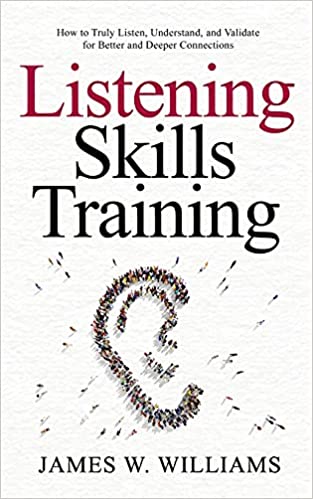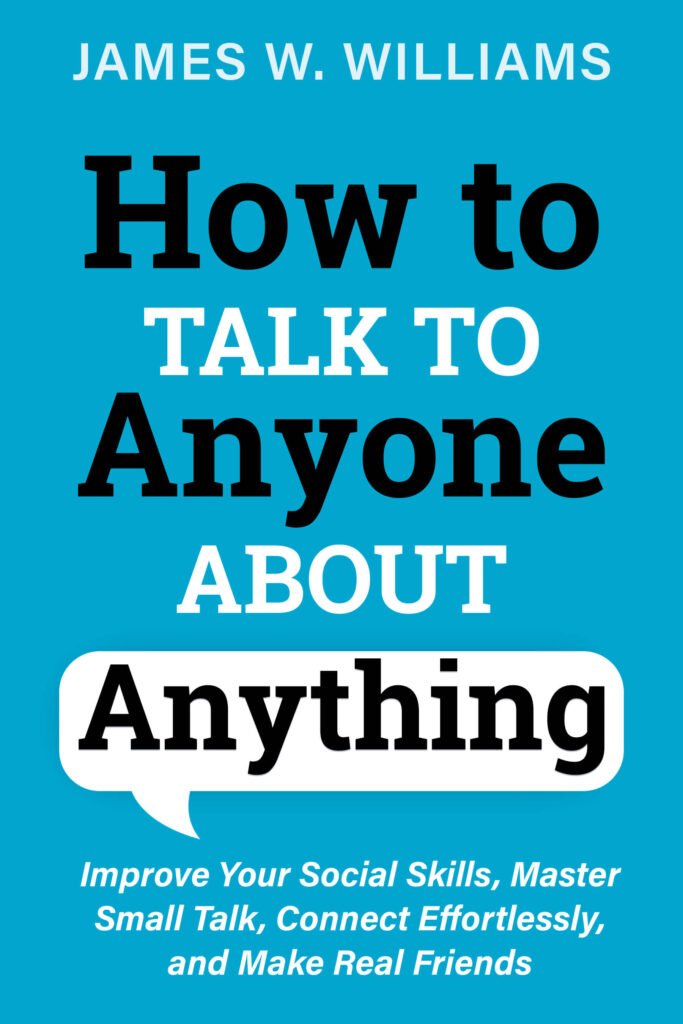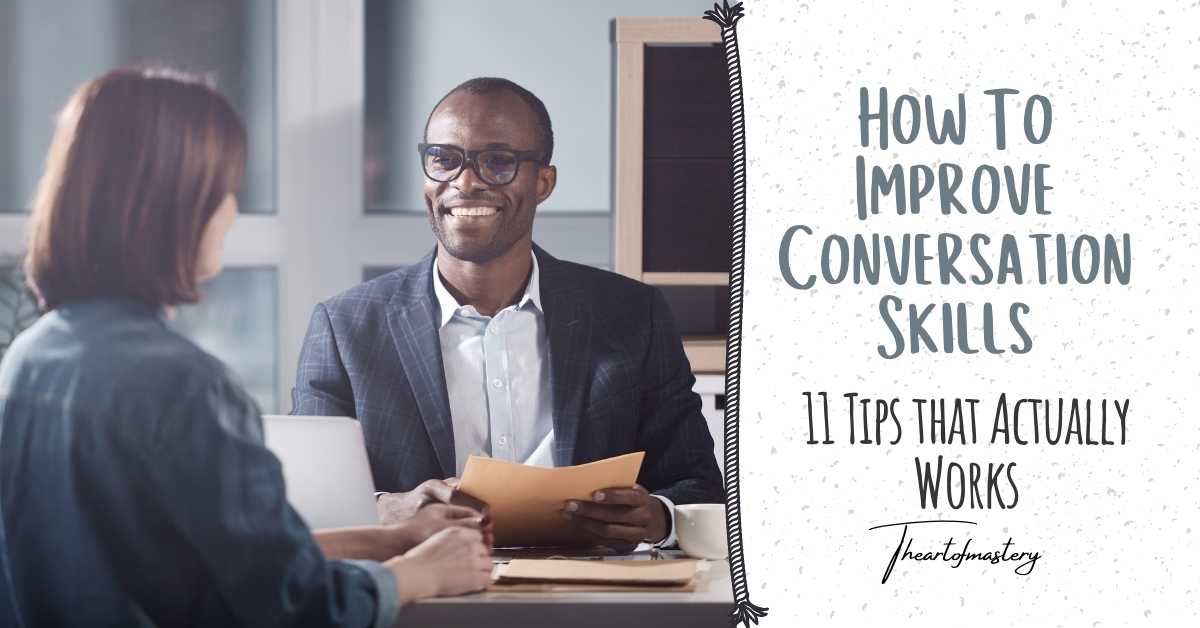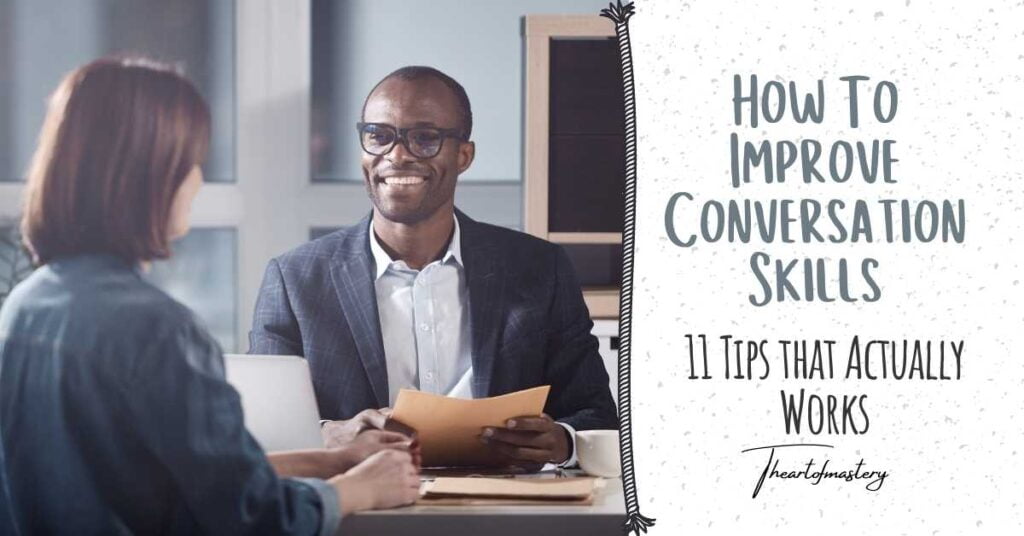This article will guide you on how to improve conversation skills. Not all are gifted with the talent of a good talker. As Annika Thor said, “A good conversation is so much more than words, a conversation is eyes, smiles, the silences between the words.” Engaging in a conversation is not just talking. Learning to talk properly is an important skill. I will give you essential tips on how to improve conversation skills.

- Why is conversation skill so important?
- Here are 11 tips on how to improve conversation skills that would work.
- 1. Smile! Show a pleasant personality
- 2. Maintain eye contact
- 3. Speak clearly and in a moderate voice
- 4. Listen with Empathy
- 5. Respond with Emotion
- 6. Maintain a Relaxed Body Language
- 7. Engage and Sustain
- 8. Study and Observe Other People
- 9. Read Books About How to Improve Conversation Skills
- 10. Practice
- 11. Test yourself
- Conclusion
- READ MORE:
Why is conversation skill so important?
According to the survey, communication skill is topping at 71% as the most critical trait to have. This result shows that communication skills are an important aspect to achieve success particularly in your career and your relationship with people. One of the basic, but most important requirements emphasized by employers for job seekers is that you must have good communication skills.
Here are 11 tips on how to improve conversation skills that would work.
- Smile. Show a pleasant personality.
- Maintain eye contact.
- Speak in a clear and moderate voice.
- Listen with empathy.
- Respond with emotion.
- Maintain relaxed body language.
- Engage and sustain.
- Study and observe other people.
- Read books about how to improve conversation skills.
- Practice.
- Test yourself.
1. Smile! Show a pleasant personality
Who would want to converse with a grumpy and gloomy person? No one, right? That is why it is important to show a pleasant smiling image. Not only when there are people around you, but at most times. Pleasantness is a feeling rather than an outward appearance. When pleasantness becomes a feeling, it radiates outward and people will notice. Aside from feeling pleasant inside, project yourself through proper dress code and grooming. Remember that a first impression lasts. Impress people with your oozing personality as early as possible.
2. Maintain eye contact
A pleasant personality is just one step in the right direction. You may gain the attention of someone at first glance, but it only creates a shallow first impression. Sustain that first impression with eye contact. When you are conversing either one-on-one or with a crowd make sure to catch eye contact from time to time. Maintaining eye contact is sending an unspoken message to your audience or an individual saying that you can be trusted. As the saying goes, “the eyes are the windows of the soul.” Maintaining eye contact builds trust, credibility, and confidence.
3. Speak clearly and in a moderate voice
The main purpose of speaking is to be understood. No one would want to listen to you if you are just garbling and babbling nor shouting or speaking in a very loud voice. Speak confidently.
4. Listen with Empathy
Effective communication is all about listening. Remember that most people need a listening ear. Listen genuinely and respond appropriately. Do not interrupt out of the blue, find a perfect gap in your conversation where you can speak. Acknowledge what the person said and respond appropriately as much as possible. Show empathy when you speak. When your audience or someone sees that you are listening intently through your eye contact, your body language, and facial expressions they will feel connected with you. Take note that effective verbal communication is not just about speaking, but most importantly, it is also about listening. James William’s book entitled, “Listening Skills Training: How to Truly Listen, Understand, and Validate for Better and Deeper Connections,” has great tips. You may want to check it out.

5. Respond with Emotion
Psychologists have proven that EQ (Emotional Quotient) is equally important as IQ (Intelligence Quotient). Research shows that school children remembered the lesson best when their teacher teaches with emotion. For instance, injecting humor in the lesson or connecting the lesson with their personal experience.
This is the same when you are talking with someone, respond with relatable and appropriate emotion. Responding with an appropriate emotion is acknowledging the feelings of someone you are talking with. When they are happy, you should also be happy for them and when they are sad, you must show empathy. People will remember you because you have touched the emotional part of their being. Here are some examples to respond with emotion:
- give a genuine compliment (even a small compliment means a lot to people, but make sure that you hit the compliment at the right spot, it could be misunderstood, be mindful);
- notice details (these details could become a conversation piece that could bring you to a deeper and more relaxed conversation with someone, for instance, notice their shoes, their bags, or anything trivial about someone you are talking with);
- your emotional response depends on whom you are talking with (is it your boss, your co-worker, some random stranger, or a friend?) Understanding your level of connectedness with people around you will help you respond appropriately.
- responding with emotion goes hand in hand with choosing the right words to say. Think before you speak. If you don’t know what to say, be genuinely honest about it rather than pretend to know something.
6. Maintain a Relaxed Body Language
Your body language speaks a thousand words, so be wary of your body gestures. Here are some body languages that you must avoid.
- Crossing arms or putting both hands on your hips does not project positive open conversation.
- Fidgeting while conversing with someone shows disinterest.
- Looking all over the place and glancing sideways in a noticeable manner shows that you are not ready for the conversation.
- Not maintaining eye contact shows disrespect.
Maintaining a relaxed body language is non-threatening and creates an aura of openness. Practice it at all times.
7. Engage and Sustain
If you have successfully achieved the tips from numbers 1-6 it means that you have engaged your audience well. Now your next task is to sustain the interest of your audience or the person you are talking with. In my opinion and according to my experiences, I get fascinated with a talker who knows a lot of topics. People who can converse with topics on various fields of interest amaze me. I wouldn’t mind talking with people longer if I can get interesting insights and topics that I don’t know yet.
So, if you want to sustain your conversation offer topics that you think would interest your audience. Read a lot about various topics so that you have more to offer. And if your audience has questions you have some solutions or answers to offer.

8. Study and Observe Other People
There are two things you must remember: one, observe great conversationalists and study how they converse; two, study and observe your listeners.
- First, pick someone that will serve as your model. Listen to that person always; observe how that person converse; his body language and the words that he uses. You can pick out the thing that you like and improve on other things. However, be your person and be original in your approach.
- Second, study and observe the non-verbal communication of people around you. Some non-verbal communication includes the tone and pitch of the voice, body movement, facial expression, posture, eye contact, and some physiological manifestations. These non-verbal communications give you an important clue on how to convey your message more clearly.
Some of these cues are their level of interest, agreement, comprehension, level of engagement with the message, and belief in your message.
9. Read Books About How to Improve Conversation Skills
There is a significant difference between a normal conversation and a genuinely good conversation with a strong connection. A meaningful conversation creates a wonderful mutual feeling. I have experienced it myself many times, it feels great to see that your message has come across and well appreciated. The book “How to Talk to Anyone About Anything” covers useful topics about how to improve conversation skills. It covers other important topics such as.
- improving your social skills;
- mastering small talk;
- connecting effortlessly; and
- Making real friends

10. Practice
Nothing is more important than practice. Theories and tips are just there to guide you. No matter how many tips and books you have read and memorized if you do not act you will not improve. So, practice! You can practice in front of the mirror. Let me tell you, practicing in front of the mirror is very effective. It allows you to see yourself talking so that you will know which part to improve on. You can also practice with children. Children can be the best critique because they speak their minds without judgment.
11. Test yourself
There are plenty of free testing tools on the internet that measure your level of communication effectiveness and conversation skills. You might try to assess yourself for further improvement.
Conclusion
Yes, I know there are lots to remember but if you want to improve your communication skills. However, it is worth all the effort. Being good at speaking to different kinds of people will make you gain self-confidence.
If you’ve got personal experiences or stories in your journey to improve your conversation skills, feel free to share them below. You can also share interesting insights from this article. Or if you have a question in mind, go ahead and share your thoughts. I will gladly reply to each of your queries.





